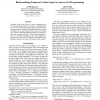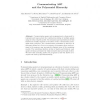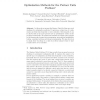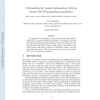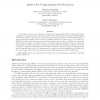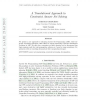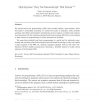135
click to vote
AAAI
2012
13 years 4 months ago
2012
Temporal Action Logics (TAL) is a class of temporal logics for reasoning about actions. We present a reformulation of TAL in Answer Set Programming (ASP), and discuss some synergi...
236
click to vote
LPNMR
2011
Springer
14 years 5 months ago
2011
Springer
Communicating answer set programming is a framework to represent and reason about the combined knowledge of multiple agents using the idea of stable models. The semantics and expre...
162
click to vote
CPAIOR
2011
Springer
14 years 5 months ago
2011
Springer
In this work we present the Partner Units Problem as a novel challenge for optimization methods. It captures a certain type of configuration problem that frequently occurs in indu...
114
click to vote
KSEM
2010
Springer
14 years 12 months ago
2010
Springer
We examine the practicality for a user of using Answer Set Programming (ASP) for representing logical formalisms. Our example is a formalism aiming at capturing causal explanation...
144
click to vote
KR
2010
Springer
14 years 12 months ago
2010
Springer
In this paper, we propose a progression semantics for firstorder answer set programs. Based on this new semantics, we are able to define the notion of boundedness for answer set p...
158
click to vote
TPLP
2010
15 years 13 days ago
2010
In this paper we explore the use of Answer Set Programming (ASP) to formalize, and reason about, psychological knowledge. In the field of psychology, a considerable amount of kno...
132
click to vote
LOGCOM
2010
15 years 15 days ago
2010
In this paper, we propose an extension of Answer Set Programming (ASP) to support declarative reasoning on consumption and production of resources. We call the proposed extension ...
169
click to vote
JELIA
2010
Springer
15 years 16 days ago
2010
Springer
In this paper, we show that Reiter’s default logic in the propositional case can be translated into answer set programming by identifying the internal relationships among formula...
115
click to vote
CORR
2010
Springer
15 years 1 months ago
2010
Springer
We present a new approach to enhancing Answer Set Programming (ASP) with Constraint Processing techniques which allows for solving interesting Constraint Satisfaction Problems in ...
150
Voted
JAPLL
2007
15 years 2 months ago
2007
We extend answer set programming (ASP) with, possibly infinite, open domains. Since this leads to undecidable reasoning, we restrict the syntax of programs, while carefully guard...
